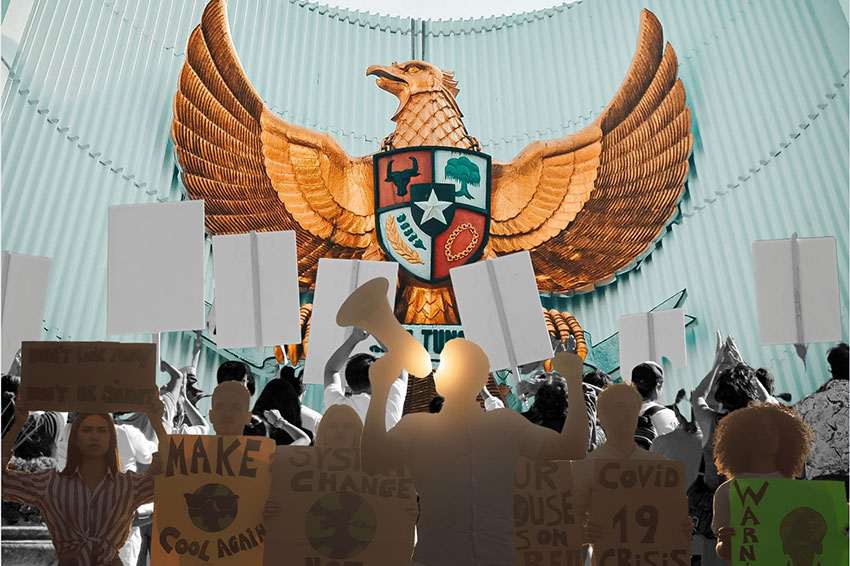Let Us Come Together Again (Part I): United in the House of Pancasila

The demonstrations that recently erupted in various parts of Indonesia reveal the double face of our democracy.
On one hand, demonstrations are a sign of the people’s political vitality—a legitimate space for expressing aspirations in a democratic state.
They affirm that the people’s voice is still alive, still wants to be heard, and can still move within collective consciousness.
On the other hand, the chaos that accompanied them—the destruction of public facilities and the material losses incurred—exposes the fragility of our political maturity in managing differences.
In fact, democracy should serve as an arena for deliberation, but it has instead been reduced to a battleground that harms the people themselves.
It is at this point that the call, “Let us come together again, united in the House of Pancasila,” finds its deepest meaning—not merely a moral rhetoric, but a philosophical homecoming, a return to unity that is increasingly urgent to preserve.
Demonstrations in essence are not something to be suspected or feared. They are a legitimate part of citizens’ political participation, recognized by democracy as a form of social control over the exercise of power.
Yet, like fire that can provide warmth or cause destruction, demonstrations too have two faces.
When conducted peacefully, they strengthen the political system by offering space for correction.
But when they devolve into anarchy, their noble value fades, replaced by painful wounds.
Public facilities destroyed are not merely walls and steel burned down, but also symbols of the collapse of collective awareness about shared ownership.
Bus stops, roads, service buildings, and other public facilities are not the state’s property in a bureaucratic sense alone, but the people’s property – ours, used daily.
Thus, every act of destruction during violent demonstrations ultimately adds to society’s burden, forcing the state to divert development funds to patch wounds, creating a recurring cycle of dissatisfaction.
Here, Pancasila stands not only as a normative foundation but as a national home.
And of its five principles, the Unity of Indonesia becomes the pillar most urgently needed.
Unity is not just a beautiful phrase spoken at ceremonies, but an absolute requirement for the survival of a nation born from diversity.
Unity of Indonesia demands deep awareness that diversity is a historical destiny.
It is not a negotiable choice but a reality that must be wisely managed.
From Sabang to Merauke, from Miangas to Rote, this nation rests upon the foundation of vast diversity: hundreds of ethnicities, regional languages, beliefs, and cultures.
If this diversity is not sheltered under the spirit of unity, Indonesia would only become a stage for endless conflict.
But if differences are woven into one bond, this nation will stand as a stunning example to the world: how a great country can maintain harmony amid extreme pluralism.
Thus, unity is not something abstract.
It must be real in daily life – in inclusive public policies, in political spaces that accommodate the people’s aspirations without resorting to violence.
It must live in education that instills cooperation and solidarity from an early age.
Unity does not mean closing the door to criticism, but ensuring criticism is delivered within a national framework, constructively.
Unity does not mean eliminating differences of opinion, but giving space for them to become material for deliberation and wiser decisions.
Therefore, the call “Let us come together again, united in the House of Pancasila” is truly a call to reaffirm the Unity of Indonesia as a living value.
We may differ in political choices, even in visions of the future.
But above all, we remain one nation, bound by a shared history and shared ideals.
The bright future of this nation can only be achieved if unity becomes the central axis.
The state can never advance far if its energy is drained repairing the damages caused by the immature offspring of democracy.
Here, Pancasila reveals its profound philosophical face.
The Third Principle, Unity of Indonesia, is not merely an appeal to avoid conflict, but an ontological vision: that the very existence of this nation is meaningful only if we place ourselves as part of the whole.
Pancasila teaches that freedom without unity breeds chaos, but unity woven through freedom becomes the solid foundation for a great civilization.
This is the wisdom that distinguishes Pancasila from a mere political contract; it is a philosophy of life guiding the nation beyond self-interest.
Thus, unity within the framework of Pancasila is not the enforcement of homogeneity, but the recognition of pluralism managed wisely.
This philosophy affirms that differences are not threats, but spaces for shared learning that enrich the nation’s soul.
When elites are more preoccupied with narrow interests, when citizens are easily trapped in polarization, the noble call of Pancasila seems to lose its resonance.
Unity cannot remain a slogan; it must be realized in decisions, policies, and attitudes that uphold national interests above personal interests.
Without this, Indonesia will be trapped in exhausting and destructive cycles of conflict.
Therefore, the call of history today is clear: we must return to the House of Pancasila, where every child of the nation feels safe, equal, and respected.
Prof. Dr. Ermaya Suradinata, SH, MH, MS, was Governor of Indonesia’s National Resilience Institute (2001–2005) and Director General of Politics and Social Affairs, Ministry of Home Affairs (1998–2000). He is an Expert Council Member of BPIP (Agency for Pancasila Ideology Education) in the field of Geopolitics and Governance, and Chairman of the Advisory Board of the Center for Geopolitics & Geostrategy Studies Indonesia (CGSI).
